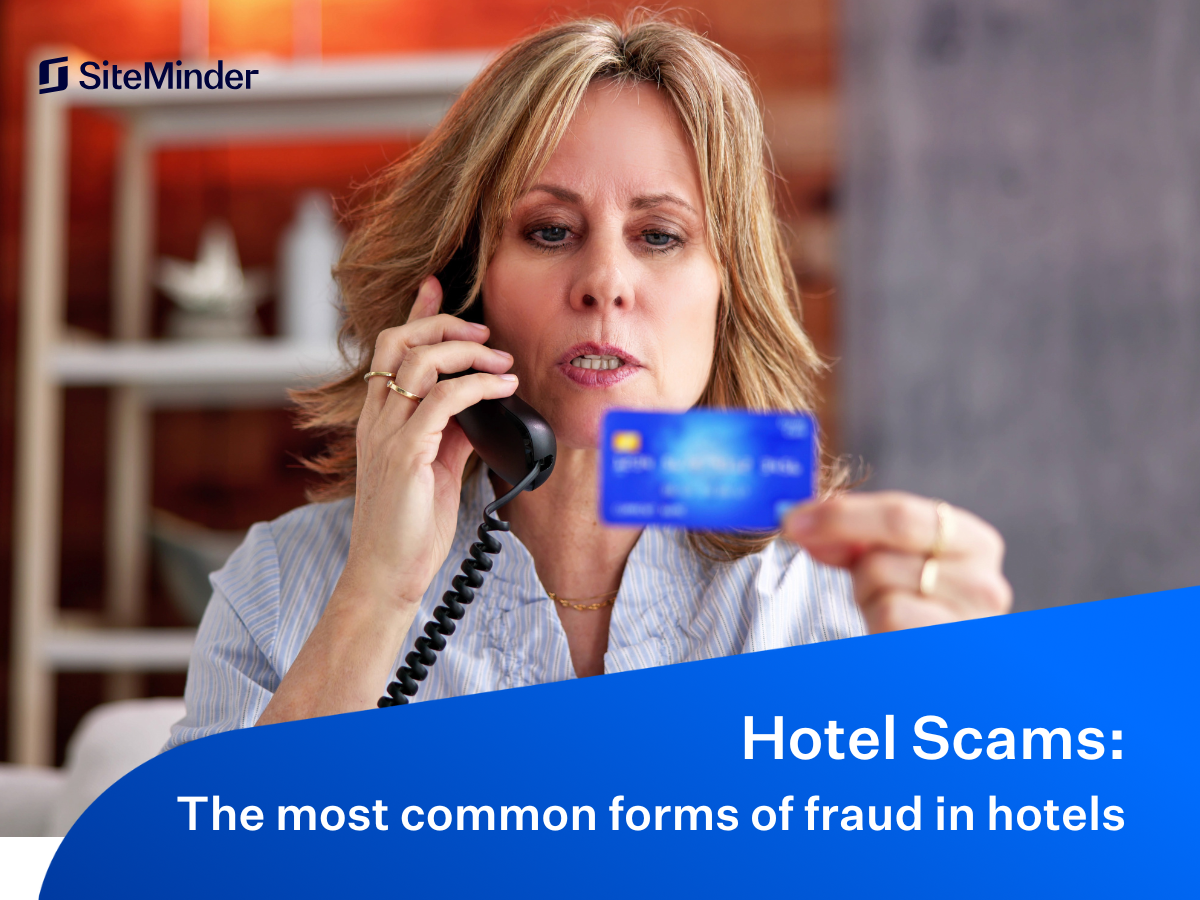What are hotel scams?
Hotel scams are fraudulent schemes targeting both hotel guests and hotel businesses. These scams can take many forms, including fake booking websites that trick guests into paying for non-existent reservations, phishing emails or phone calls pretending to be from the hotel asking for sensitive information, or misleading promotions designed to capture credit card details.
Guests may also be targeted by fake Wi-Fi networks in hotels, where scammers set up unsecured networks to steal personal information. Hotel businesses themselves can face cyber attacks aimed at breaching payment systems or accessing sensitive guest data.
This blog will give you insight into all the different types of hotel scams and how you can prevent them at your business.
Why are hotels vulnerable to scams?
Hotels can be vulnerable to scams because there are so many ways that scams can operate, from fake booking websites to fraudulent credit card transactions. Essentially, they are deceptive practices aimed at stealing money, services, or sensitive information from hotels and their guests.
These scams can not only harm your bottom line but also damage your reputation if not handled properly.
Protect your hotel and guests from scams with SiteMinder
Stay ahead of fraud with SiteMinder’s tools, designed to block suspicious transactions, safeguard promotions, and verify legitimate bookings.
Learn more

What are examples of suspicious behaviour in hotels?
Hotels are particularly attractive to scammers for several reasons. The high volume of guests, frequent online transactions, and reliance on third-party booking platforms create opportunities for fraudsters to slip through the cracks. Plus, with so many daily transactions, it’s easy for small anomalies to go unnoticed—until it’s too late.
Suspicious behaviour in hotels can range from minor rule violations to activities that may signal potential criminal or dangerous behaviour. Below are examples of suspicious behaviours that hotel staff and security should be aware of:
- Frequent room changes or multiple reservations: Guests who frequently change rooms or have multiple bookings under different names may be trying to avoid detection or hide their identity.
- Refusal to show identification: Guests who are unwilling to provide identification or use fake IDs when checking in can be cause for concern, as they may be attempting to hide their identity or commit fraud.
- Damaged or altered identification: Similar to a flat refusal, a guest presenting damaged, altered, or suspicious identification documents is a red flag for potential fraud or criminal activity.
- Requests for isolated rooms: Guests specifically requesting rooms far from others, such as near emergency exits or in less visible areas, could be trying to avoid surveillance or planning illicit activities.
- Excessive use of ‘Do Not Disturb’ signs: A guest who consistently uses the ‘Do Not Disturb’ sign for extended periods may be trying to prevent housekeeping from entering and discovering illegal activities.
- Paying in cash only: Guests who insist on paying only in cash, especially for extended stays, may be trying to avoid leaving a traceable financial record.
- Unusual luggage or large amounts of luggage: A guest bringing excessive or unusual luggage (such as large cases with no clear explanation) could be smuggling illegal items or storing stolen goods.
- Excessive visitors to a room: Frequent visitors to a guest’s room, particularly at odd hours, can be a sign of illegal activities such as drug dealing.
- Tampering with security systems: Any attempts to tamper with cameras, door locks, or other hotel security measures are clear red flags and may indicate criminal intentions.
- Unusual noise or strong odours: Loud noises, smells like chemicals or smoke, or other unusual disturbances emanating from a guest room could indicate drug manufacturing, weapons storage, or other illicit activities.
- Unusual behaviour at check-in: Guests who appear overly nervous, avoid eye contact, or provide inconsistent or vague information during the check-in process may be hiding something suspicious.
- Use of hotel amenities without being a guest: Individuals loitering in hotel common areas or using facilities like gyms and pools without being registered guests can be signs of trespassing or theft.
Each of these behaviours could be harmless on its own but may become suspicious when combined with other signs.

Common types of hotel fraud
Here’s a closer look at some of the most common scams that could target your hotel:
- Friendly fraud. Sometimes, a guest might dispute a legitimate charge, claiming they didn’t authorise it or that they never received the service – but they aren’t deliberately trying to defraud your business. They’ve just made a mistake.
- Chargeback fraud. Similar to friendly fraud, this involves guests requesting a refund through their credit card company after using your services, without notifying you first. This leaves you with a financial loss and possibly even penalties.
- Credit card fraud. Unfortunately, hotels are frequent targets for credit card scams, where stolen or fake cards are used to make bookings or payments. This can lead to chargebacks, financial loss, and a dent in your hotel’s reputation.
- Coupon fraud. Scammers may misuse promotional offers or discount codes, exploiting these deals to get services for free or at a lower cost than intended. This doesn’t just hurt your revenue—it can also throw off your promotional efforts.
- Fake booking website. Fraudsters sometimes create websites that look just like your hotel’s official site to trick guests into booking rooms that don’t exist. This can lead to lost revenue and upset guests who might blame your hotel for the scam.
- Invoice scams. Fraudsters send fake invoices to your hotel, hoping your accounts team will pay them without realising they’re not legitimate. These scams can be particularly damaging, especially if large sums are involved.
Ways to prevent hotel scams
Hotel scams can be challenging to manage, but by implementing the right strategies and using tools like SiteMinder, you can protect your property and guests from fraudulent activities. Here’s how SiteMinder can help:
How to prevent friendly fraud in hotels
Friendly fraud, where a guest disputes legitimate charges, can be mitigated with strong transaction documentation. SiteMinder’s platform allows you to keep detailed records of bookings, payments, and guest communications, providing you with the evidence needed to counter fraudulent claims effectively.
How to prevent chargeback fraud in hotels
Chargeback fraud can be particularly damaging, but SiteMinder’s secure payment processing features help you verify cardholder details and reduce the risk of fraudulent transactions. By integrating SiteMinder with your payment systems, you can enforce clear cancellation and refund policies, which are crucial for defending against chargeback claims.
How to prevent credit card fraud in hotels
Credit card fraud is a common threat in the hospitality industry. SiteMinder integrates with advanced fraud detection tools that can identify suspicious activities, such as mismatched billing information or unusual booking patterns, helping you to prevent fraudulent transactions before they happen. By using SiteMinder’s secure platform, you can ensure that all credit card payments are processed with the highest level of security.
How to prevent coupon fraud in hotels
Coupon fraud, where scammers misuse promotional codes, can be managed by using SiteMinder’s promotional tools, which allow you to set unique codes and track their usage. SiteMinder ensures that your promotions are protected, reducing the likelihood of exploitation by fraudsters.
How to prevent fake booking website in hotels
Fake booking websites that mimic your hotel’s site can deceive guests and lead to lost revenue. SiteMinder helps protect your hotel’s brand by ensuring that your official booking platform is secure and easily recognisable by guests. SiteMinder’s booking engine and channel manager integrates directly with your website as well as OTAs, allowing guests to book with confidence and helping you build trust by avoiding third-party risks.
How to prevent invoice scams in hotels
Invoice scams, where fraudulent invoices are sent to your hotel for payment, can be prevented by implementing verification processes through SiteMinder’s integrated financial tools. SiteMinder’s platform allows you to cross-check invoices with booking and payment records, ensuring that only legitimate payments are processed. Additionally, SiteMinder offers insights into best practices for managing vendor relationships and financial transactions securely.
